(1)What Greek Wisdom Can Teach The Rest Of The World About Living Well. (2)Mediterranean Diet the Focus of Greek Food Startups

1.
What Greek Wisdom Can Teach The Rest Of The World About Living Well
“I came to the Greeks early, and I found answers in them," writer and classicist Edith Hamilton once said.
The Greeks have one of the oldest cultures in the world (not to mention the first known democracy), and to this day, we turn to the wellspring of Greek wisdom for guidance on living well. With both an ancient tradition of introspection and ethical inquiry, and also to one of the most heart-healthy diets in the world, the Greeks know a thing or two about how to live a good life.
But it's not just ancient Greek philosophers like Plato and Aristotle who unlocked the secrets to a meaningful life. The health habits and leisure rituals of modern Greece also have a lot to teach the rest of the world about health and happiness.
Here are 11 Greek secrets to living well.
They eat a healthy Mediterranean diet.
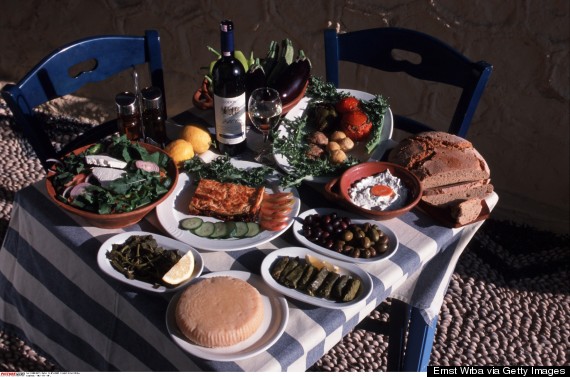
The Mediterranean diet is heavy on vegetables, olives, healthy fats and oils, fish, whole grains and red wine (in moderation), and is thought to have extensive health benefits, contributing to lower rates of heart disease, obesity, cancer, and Alzheimer's disease. Research analyzing 1.5 million healthy adults found that those who followed the Mediterranean diet had a lower risk of dying from heart disease and cancer and a reduced risk of developing Alzheimer's disease.
They take naps.
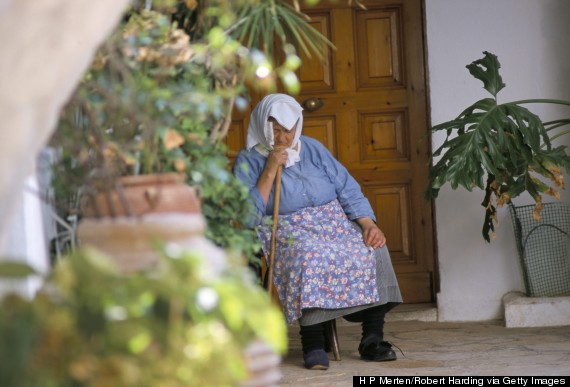
Greeks believe firmly in many things, and afternoon naps are one of them. In some of the smaller towns and villages, businesses commonly shut down in the mid-afternoon for the Greek siesta time and open again around 5 p.m.
"Napping is a response, an adaptation to the hot climate," Dimitrios Trichopoulos, a Greek researcher at the Harvard School of Public Health, told NPR. "Siesta is a very pleasant habit. In a way, it doubles your day. Because you start all over again at 5 o'clock and you can go on until 11 or 12 o'clock which is not uncommon at all in our part of the world."
They appreciate the value of a good walk.
During the warmer months, small villages and towns in Greece turn to the daily tradition of volta (translated as stroll or outing). When the sun goes down, Greek families will take leisurely walks up and down the main streets of small towns, and on the islands, they'll enjoy a leisurely stroll along the shore.
They ask the big questions.
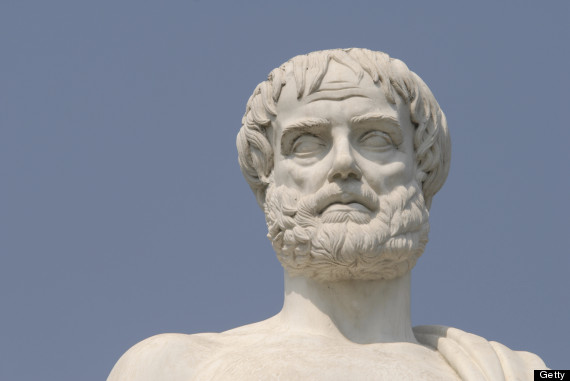
The Greek philosophical tradition is one of the oldest and arguably the richest in the world. Philosophical inquiry thrived in the culture of ancient Greek, and philosophers like Plato, Aristotle, Plotinus, Epicurus and Epictetus asked the big questions: How do we live a good life? How should the city be governed? What is morality and how should we treat others?
In many ways, we owe the tradition of living the "examined life" to the ancient Greeks. As Aristotle once wrote, "Knowing yourself is the beginning of all wisdom.”
They take hospitality and generosity very seriously.
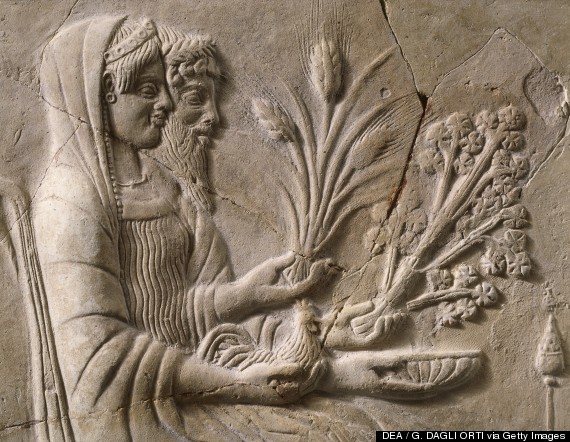
Greek hospitality goes as far back as Odysseus, and it's been embedded in Greek culture and families to this day. (Ever seen "My Big Fat Greek Wedding?"). This generosity and welcoming spirit derives from the word filoxenia, which translates to "love of foreigners." Historically, it has referred to the hospitality of villagers and residents of small towns who would take in travelers passing through, offering a meal and a bed, whereas now it generally refers to the hospitality offered to friends, family or acquaintances, according to Greek Care, a website that teaches Australians about traditional Greek culture.
They've unlocked the secrets to longevity.
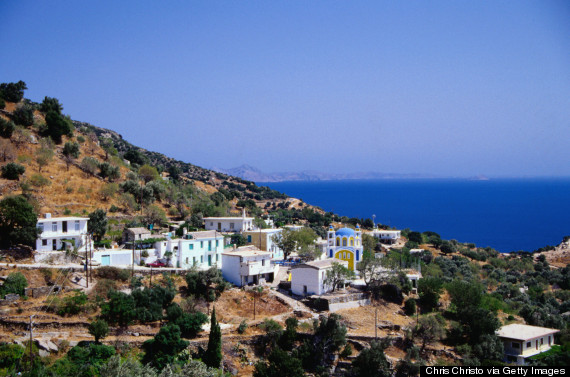
The little Mediterranean island of Ikaria has one of the healthiest, longest-living populations in the world. Ikarian men are nearly four times as likely as American men to reach the age of 90, and often in better health, according to a 2012 New York Times article, "The Island Where People Forget To Die." They also have lower rates of depression and dementia. Their secrets to long life? A fresh, healthy Mediterranean diet, lots of outdoor and leisure time, strong families and communities and plenty of sleep.
“We wake up late and always take naps,” Dr. Ilias Leriadis, an Ikarian physician, told the New York Times. “I don’t even open my office until 11 a.m. because no one comes before then.”
They take time for leisure.
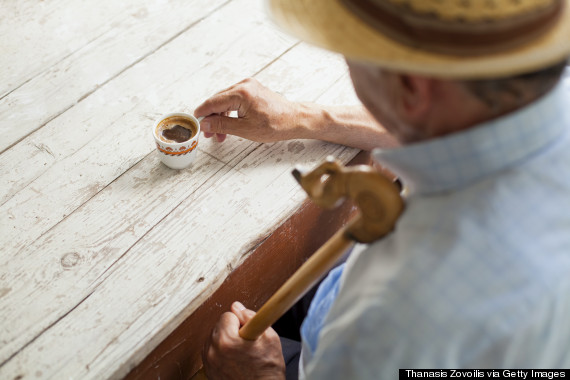
Another longevity secret of the Ikarians? They live by "island time."
“Have you noticed that no one wears a watch here? No clock is working correctly," Leriadia said. "When you invite someone to lunch, they might come at 10 a.m. or 6 p.m. We simply don’t care about the clock here.”
But taking time to savor life's little pleasure isn't limited to Ikaria; Greeks are known for having a slower pace of life, which allows them to linger over and savor family activities, long meals and small pleasures. As a Manchester Evening News travel writer advises visitors to the Greek isles:
Take a stroll along the waterfront where the fishermen are mending their nets and unloading their catches. Pause for a coffee. Buy fresh-from-the-oven bread. Enjoy breakfast. Then let the day unfold. Slow your pace of life to that of the locals, philosophise, read a good book, bathe, snooze.
They tell stories.
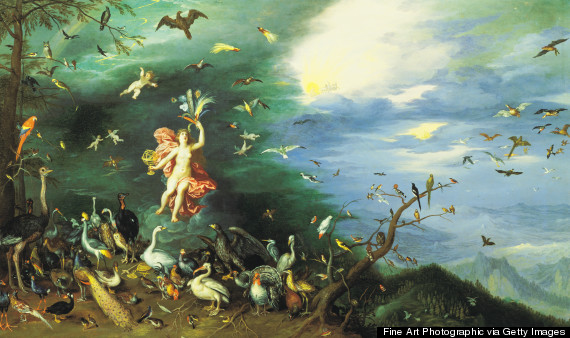
The rich tradition of Greek mythology is alive and strong in the culture today. Through these classic tales of gods and mortals, children learn classic wisdom and moral values. Traditionally, it is through stories -- which our brains use to give our lives structure and meaning -- that the Greeks have made sense of their world.
As Arianna Huffington wrote in The Gods of Greece:
"In our longing to understand ourselves and our world, the gods of the past, very much alive today, can show us our way into the future. Because they are so natural, so human in their divinity, they can help heal our culture's split between the earthly and the sacred, the secular and the religious. In the Greek gods, the eternal and the divine are fully at home with the ephemeral and earthly. The natural is the divine, and therefore nothing is accidental or meaningless."
They spend time outdoors.
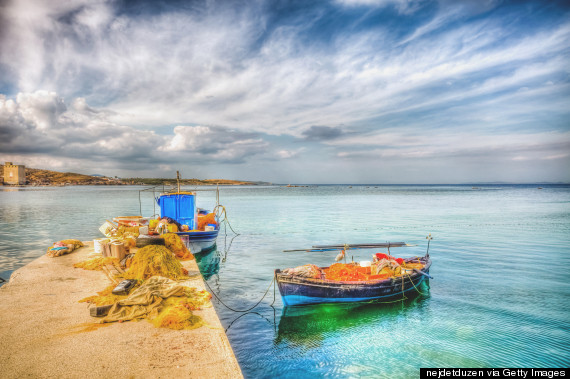
With Greece's temperate climate, warm sunshine, beautiful beaches and islands, why wouldn't you soak up the health benefits of spending time outdoors?
They come together over good food.
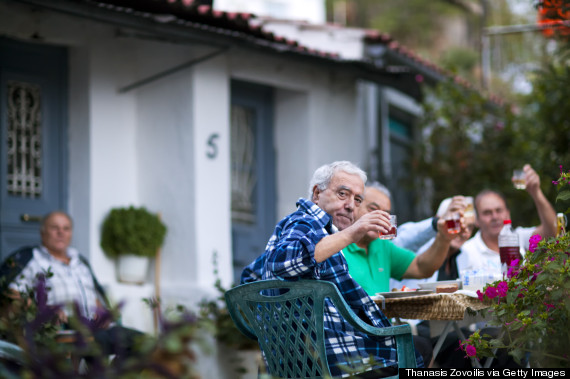
Greeks love food, and they love gathering with family, friends and community members. So naturally, it's a Greek tradition to bring people together for healthy meals.
"[My mother] loved how food brought people together," Unbinding the Heart author Agapi Stassinopolous wrote on Oprah.com. "Eating dissolves the separation between strangers. That's the Greek way, and that was our family way also -- to feed people, to show love and attention through dishes like spanakopita. At the table, my mother mended old wounds and made new friends. She reminded us that excluding anyone is simply denying yourself an opportunity to grow -- and live."
They know where to find happiness.

Stoicism was one of the ancient Greek schools of philosophy founded in Athens that remains relevant to this day. The Stoics believed that stress and unhappiness are not the result of external events, but rather the product of our own internal judgments, and therefore that happiness, too, can only be found within. The Stoic philosopher Epictetus said that the one way to happiness was to look within; to "cease worrying about things which are beyond the power or our will. ”
"Stoicism took off because it offered security and peace in a time of warfare and crisis,” HuffPost Managing Editor Jimmy Soni wrote in his book Rome's Last Citizen, a biography of noted Stoic, Cato the Younger. “The Stoic creed didn't promise material security or a peace in the afterlife; but it did promise an unshakable happiness in this life."
ΠΗΓΗ
http://www.huffingtonpost.com
/2013/12/03/
2.
Mediterranean Diet the Focus of Greek Food Startups
One of the "good" things that may have come from this economic crisis here in Greece is that it has spurred a creativity boost among the young. More and more Greeks are looking to start their own business. This comes as no surprise considering that the unemployment rate among young Greeks has reached 57 percent according to the latest Eurostat figures.
At this time Greece has two things going for them: high availability of scientists and engineers (Greece was ranked fifth according to the Global Competitiveness Report by the World Economic Forum) and ... food. Environmentally but also historically Greece is not only known for high quality products such as olive oil which is known for its fruity and robust flavor but also its high polyphenol content, but also because the traditional Greek diet and in particular the Cretan diet was the prototype of the Mediterranean Diet Pyramid. The foods that make up this diet are all produced in Greece.
Combine all these factors and what do you get? Greek food startups that not only have the potential of making money, but of promoting the traditional Greek diet and its special relationship with the Mediterranean diet, which for so many years Greece has failed to do.
Gaea, one of the most successful Greek companies that produces and exports Greek olive oil and other traditional Greek products organized an initiative called Re-Inspire Greece, to inspire Greek youth to start their own companies. The initiative offered the opportunity to young Greeks to present their idea and business plan in the agro-business sector. Awards of 50,000 Euros capital and soft loans were provided to 8 food startups along with support from various organizations such as The American Farm School of Thessaloniki.
During the final event, which included beanbags as seating, loud music and aerial acrobatic shows, contestants had to present their idea on stage to the judges. Most of the concepts were based on promoting and exporting Greek ingredients that have been part of the Mediterranean diet for years, rather than gimmicky products, which have nothing to do with Greek culture.
Sharing the first place position was Family Farm, a company packaging and exporting what they call "occupation" foods: rice and beans. Though these foods may have once been associated with the occupation of Greece during World War II, today they are prized particularly as they are produced in Northern Greece, an area known for the production of high quality legumes.
The other first place winner is a company called Radiki. Radiki in Greek means dandelion, a common leafy green in the Greek diet. Radiki's goal is to dry Greek wild greens package them and export them all over the world.
Both these companies are basically exporting key components of the Greek-Mediterranean diet. The antioxidant rich beans are a common dish in the traditional Greek diet as Greeks consumed them a source of protein not only because they could not afford meat, but because Greeks fasted from animal products for religious reasons for almost 200 days a year.
Wild greens are what one may call the secret of the Greek diet as they are rich in antioxidants but also omega-3 fatty acids and are consumed in a variety of ways in Greece, most commonly gently boiled and served with olive oil and lemon.
Other winners included Golden Black, a company specializing in the Corinthian currant, a type of black raisin that is produced mainly in Greece and has an intense flavor and high phenolic content that may protect from cancer and aid in the management of diabetes according to recent studies. This company dries the grapes in the shade rather than directly in the sunlight resulting in a richer and fuller flavor. The company Daphnis & Cloe presented their simple and elegant concept of packaging Greek herbs such as oregano and exporting in several countries. Other winners included Creative Bees, a group of Cretan beekeepers producing Cretan honey but also other traditional Cretan honey products and Demetra Pies, another startup composed of young Greek engineers who want to export authentic Greek pies in the US.
If you look beyond all the packaging, business plans and awards what you see are young people embracing the humble ingredients of their traditional diet, which is slowly fading. Those very ingredients: olive oil, wild greens, beans, raisins and herbs, provided sustenance for Greeks in difficult times during wars and occupations, and may very well come to the rescue once again.
Elena Paravantes RD
-Registered Dietitian, Nutritionist,
writer specializing in the Mediterranean
25-11-2013
ΠΗΓΗ
ΠΗΓΗ
http://www.huffingtonpost.com/
elena-paravantes/mediterranean-diet-the-food_
b_4336123.html
ΣΧΕΤΙΚΑ
http://www.huffingtonpost.com/elena-paravantes/
- Beauties of Greece (62 ΑΝΑΡΤΗΣΕΙΣ)
Παλαιότερες αναρτήσεις ''Beauties of Greece !'':
http://ivan-2-google.blogspot.gr/search/label/Beauties%20of%20Greece?updated-max=2013-11-02T14:46:00-07:00&max-results=20&start=8&by-date=false
http://ivan-2-google.blogspot.gr/search/label/Beauties%20of%20Greece?updated-max=2013-11-02T14:46:00-07:00&max-results=20&start=8&by-date=false